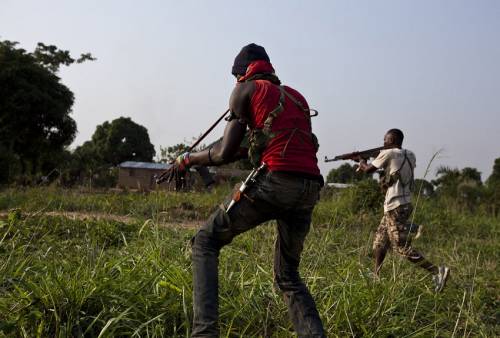Three Women Narrate How They Struggle To Survive As Widows, Single Mothers After Terrorists Killed Their Husbands In Zamfara
Posted by Amarachi on Mon 11th Sep, 2023 - tori.ng 
A 24-year-old woman, Yusrah, was five months pregnant when terrorists killed her husband, Zakaraiyah.
Her husband was killed during an invasion of her village, Badarawa in the Shinkafi Local Government Area of Zamfara State in 2021.
The mother of three said her husband was among the five people killed during the terrorist attack.
She described the death of her husband as a great loss to the family because, since his death, there has been no one willing to fill the void left behind by the deceased.
“My husband had two wives. My senior wife has five children and I have three. He was the one all of us depended on.
“None of us (wives and children) were working because we never lacked anything,” Yusrah told SaharaReporters, narrating how life was for the family before the terrorists killed their sole breadwinner.
She continued: “Since his death, life has been hard for all of us. All that he left for us could not sustain us for more than four months. We are now living on the street. We beg for food, clothes and medication whenever we fall ill.
“That was why I had no choice but to push my children outside for them to also beg. We have been doing this since early 2022 without any help in sight.”
Yusrah said even though she was ready to remarry, her suitors were not ready to shoulder the added responsibility of her children – two sons and one daughter.
Nigeria has one of the highest terrorism threat levels in the world and Zamfara is one most affected states in the country’s northwest region.
The former government of President Muhammadu Buhari reported in January 2022 that an estimated 200 people were killed and 10,000 displaced in attacks by armed bandits in the state.
Yusrah’s husband, Zakaraiyah was one of the casualties of such incessant terrorist attacks.
Yusrah’s story is similar to the stories of other women who spoke to SaharaReporters during a visit to Shinkafi Local Government Area in Zamfara last weekend.
All three of them have resorted to begging for alms to survive.
Amina, a 36-year-old from Ajiyawa village narrated how her husband was killed on Friday morning by some armed bandits who attacked the community in June. She said her husband was shot dead while several other residents sustained injuries during the invasion.
According to her, the tragedy has made life difficult for her family. She told SaharaReporters that she had sent two of her daughters to work as home helps in Gusau, the state capital.
“When my husband was alive, my children were attending school. My two daughters were in primary school but I had to stop them because it is only when you have eaten that you would think of school. I sent them to Gusau in August to work,” Amina said.
“I (myself) did not have any work. I moved from one market to another to beg people for money,” she added.
Hanatu is a woman from Tungan Gobirawa village. She also lost her husband, a businessman, to a terrorist attack. She said her husband was killed by armed bandits who kidnapped him while he was going from their village to Gusau.
She said the bandits killed her husband because the family could not raise the ransom demanded before the expiration of the one-month ultimatum given to them by the terror group in 2021.
“They kidnapped my husband on his way to buy goods in Gusau. They collected all his money and held him in custody. After about three days, they called us (the family) to pay N2 million and they gave us one month.
“My husband was killed because we could not raise the ransom,” she said.
After her husband’s demise, Hannatu said she remarried but maltreatment from the new husband made her divorce him.
“He (my new husband) maltreated me, beat me and did not really care for me. This was a strange experience for me. My former husband never raised his hand against me or scolded me when he was alive,” she told SaharaReporters.
She added that she divorced her new husband in July when living with him became unbearable and had remained unmarried since then.
“If not for those bandits, my life would not have been like this,” she said.
In 2022, UNESCO reported that Nigeria had about 20 million out-of-school children, according to the latest global data on out-of-school children.
Most of the bandits and terrorist-ravaged states in the northern part of the country made the top list.
According to a report quoted by a research firm, SB Morgan, Kebbi State had 62% male and 67% female out-of-school children, Bauchi has 60% for males, and 61% for females, while Zamfara followed on the list with 57.4% for males, and 66% for females.















































